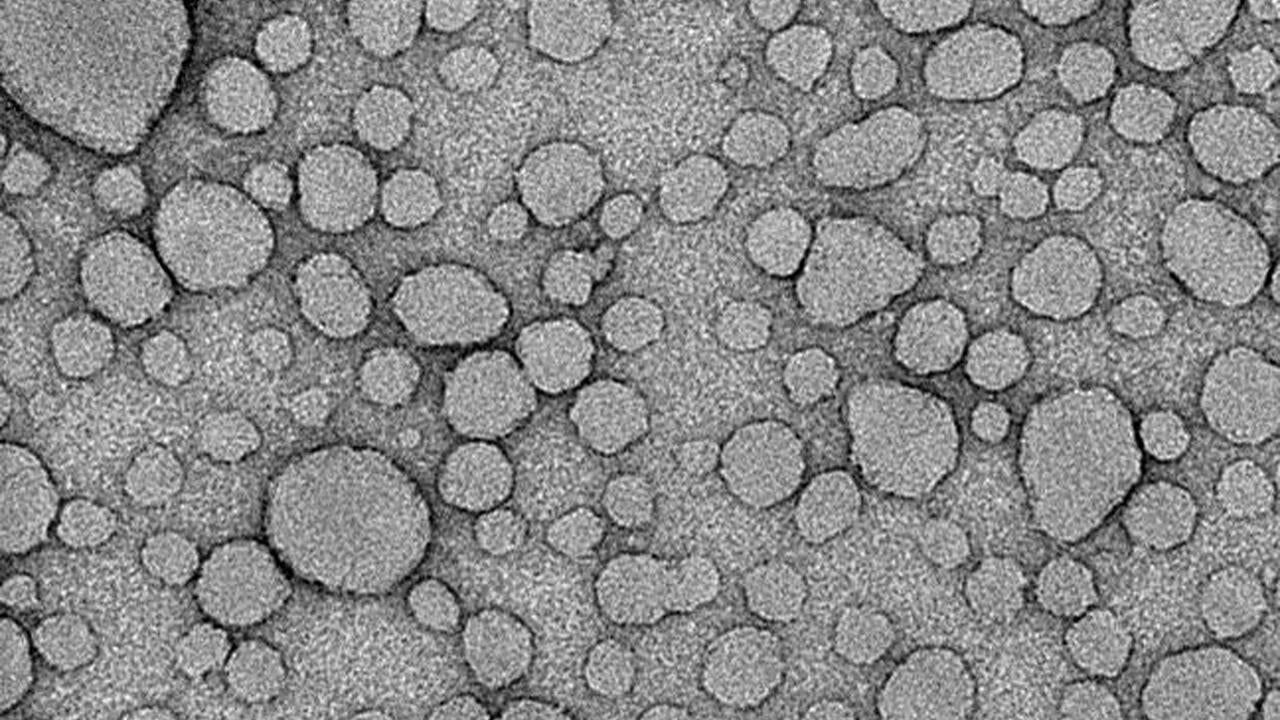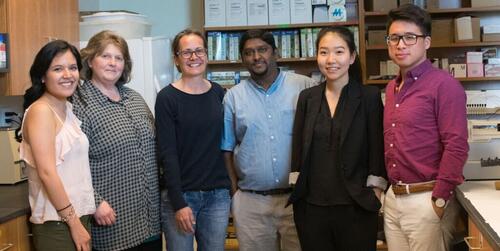
Pharmacy prof receives honours for nanomedicine research
Marianna Foldvari is a global leader in non-invasive gene therapy and nanomedicine-based large drug molecule delivery

Marianna Foldvari is a global leader in non-invasive gene therapy and nanomedicine-based large drug molecule delivery
By Alana Rigby School of Pharmacy
Marianna Foldvari standing with her lab group. From left to right: Daniella Calderon, Marianna Foldvari, Carla Sciarretta, Lokesh Narsineni, Monica Chung and Ding-Wen (Roger) Chen.
One of Waterloo’s first faculty members in its School of Pharmacy has recently been honoured with both provincial and international honours for her work in nanomedicine.
Marianna Foldvari received an award for Outstanding Lifetime Achievements in Nanoscience from NanoOntario, an organization that represents the province’s nanotechnology community. She has also been appointed a fellow of the prestigious American Association of Pharmaceutical Sciences (AAPS).
Foldvari and her research team are a few of only a handful of researchers worldwide focusing on non-invasive gene therapy and nanomedicine-based large drug molecule delivery. The NanoOntario Lifetime Achievement award recognizes Foldvari’s leadership in the field, with more than 150 peer-reviewed research papers more than 200 presentations at national and international conferences.
She researches non-invasive gene therapy and drug delivery, using nanotechnology to explore non-invasive methods of delivering biotech drugs into the body through the skin and into the back-of-the eye. These innovative methods can revolutionize treatments for dermatological diseases, vaccines and eye diseases such as glaucoma. Glaucoma has been the focus of much recent research in her lab group.
Her team excels at the challenging task of translating research discoveries into clinical applications. Many technologies developed in her lab resulted in patents and have become start-ups or moved forward for commercial development. She has formed a company with PhD students Ding-Wen (Roger) Chen and Lokesh Narsineni that will focus on developing nanomedicine innovations for glaucoma.
“Currently, patients with glaucoma are treated through pharmacotherapy, laser treatment, or surgical intervention,” says Chen, adding that these traditional interventions do reduce eye pressure but he is hoping to protect the retina or reverse eye damage through gene therapy.
Narsineni says the team’s goal is to make therapy safer and more effective without needle injection. “We are examining topical delivery methods such as eye drops that will make delivery of the therapeutic gene to the posterior segment of eye more comfortable for patients.”
Originally trained as a pharmacist at Semmelweis University in Hungary, Foldvari has studied and worked at universities across Canada. When she arrived at the University of Waterloo in 2006, her research and leadership capabilities were recognized with an appointment as Canada Research Chair in Bionanotechnology and Nanomedicine and as the School’s first Associate Director of Graduate Studies and Research.
Foldvari’s research has received approximately $23 million in grant funding over her career and many international awards.

Read more
The Government of Canada announces funding to support research in food policies and medical devices

Read more
Here are the people and events behind some of this year’s most compelling Waterloo stories

Read more
Meet five exceptional Waterloo graduate students crossing the convocation stage as Class of 2025 valedictorians
The University of Waterloo acknowledges that much of our work takes place on the traditional territory of the Neutral, Anishinaabeg, and Haudenosaunee peoples. Our main campus is situated on the Haldimand Tract, the land granted to the Six Nations that includes six miles on each side of the Grand River. Our active work toward reconciliation takes place across our campuses through research, learning, teaching, and community building, and is co-ordinated within the Office of Indigenous Relations.